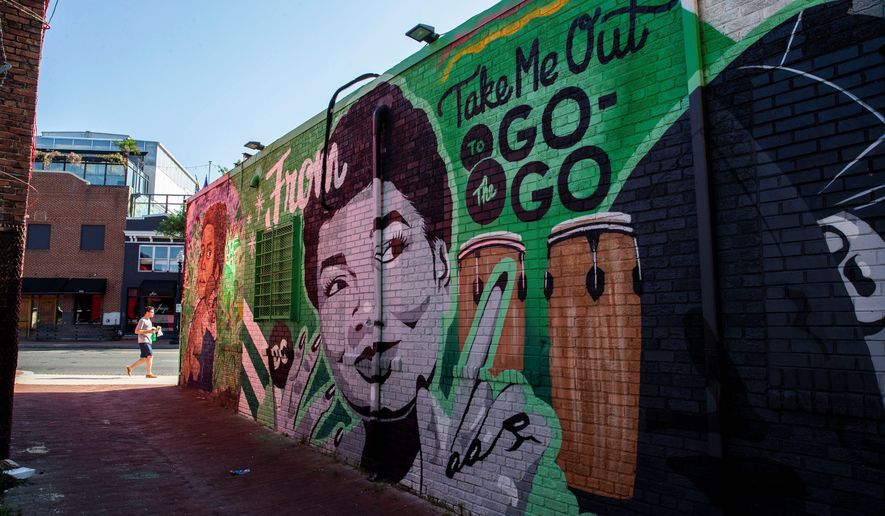The D.C. Council held a hearing Wednesday on preserving go-go music as the official sound of the city, while members of the go-go community aim to spotlight the homegrown art form in the tourism industry and in the school curriculum.
“This is just the beginning of what needs to be done to push back on the muting that powerful people have been doing to our culture for centuries,” testified Howard University communications professor Natalie Hopkinson, author of a book about go-go. “For the first time in history, maybe we can see American lawmakers move with the beat, and not against it.”
Council member Kenyan McDuffie, Ward 5 Democrat, introduced the go-go legislation in June. He was prompted by the #DontMuteDC protest, which erupted to defend the playing of go-go music outside a Metro PCS storefront at Florida Avenue and Seventh Street NW.
For about two decades, the store had been playing the music on Chuck Brown Way, a street named for the local “godfather of go-go.” Residents of a new, neighboring apartment building in Shaw complained to T-Mobile to have the music shut off, putting go-go front and center in conversations about how to preserve the music and fight the effects of gentrification. The music continues to play with the stamp of approval from T-Mobile’s CEO.
“I think it’s long overdue,” activist Ronald Moten said of the legislation in an interview with The Washington Times. “If you go anywhere in the country — Memphis, New Orleans — they honor the music that originated in the city. They treat it like it belongs to them.”
“You don’t have to have grown up listening to go-go. You don’t even have to really love go-go,” Mr. McDuffie told The Times. “I think it’s important, though, to understand and respect the culture that is go-go in the District of Columbia.”
However, many members of the go-go community lamented how the music scene is not what it used to be due in part to gentrification and the criminalization of go-go by the government and police.
In her testimony Wednesday, Ms. Hopkinson mentioned how former Council member Frank Smith Jr. had instituted a “go-go curfew,” which barred youth from go-go events and other public dance halls but did not include prohibitions to movie theaters or other European art forms like ballet or opera.
Larry “Stomp Dogg” Atwater of the Northeast Groovers go-go band told The Times that schools are failing to get kids interested in music and to teach kids about go-go, adding that the music program he participated in as a kid saved his life.
“Go-go is very important to this city because we need something to help these kids get back to doing something after school and on weekends,” Mr. Atwater said in an interview.
Mr. Atwater said the number of venues have decreased significantly in the District because of curfews, the fact that there are no longer all-ages nights, and that many of the clubs were told if they played go-go they would be shutdown.
He said a handful of go-go clubs used to operate near the intersection of Bladensburg Road and New York Avenue NE when he first started playing in the ‘90s, but only one still stands, Aqua.
“There were three or four bands playing on the same side of town on the same night and everybody would draw their own crowd and now there are very few spots for groups to play,” Andre “Whiteboy” Johnson, lead guitarist of go-go band Rare Essence, told The Times.
Mr. Johnson said there used to be summer concerts in the park, which is where many young people were inspired to start playing go-go.
Now, longtime go-go bands maintain their fan base and still tour across the country, but there aren’t many new go-go bands, Kip Lornell, a music professor at George Washington University, said in an interview.
He and Ms. Hopkinson said many of their students don’t know about go-go music.
“If you don’t live there and aren’t attuned to it, you don’t know anything about it,” Mr. Lornell said, adding though that new artists like Wale and Goldlink often play homage to go-go in their music.
Justin “Yaddiya” Johnson, founder of Long Live Go-Go, is working to unify people through go-go and bring it to new spaces in the District. He brought go-go bands to the Eaton Hotel and organized a go-go yoga class.
Mr. Johnson also organized about 10 rallies over the summer where go-go bands played and between acts organizations like Black Mamas Bail Out, Moms Demand Action, 51 for 51, the American Civil Liberities Union shared information about their causes. He said anywhere from 2,000 to 6,000 people attended each rally.
“There’s a real opportunity for go-go to create some type of economy that can benefit the community,” Mr. Johnson told The Times. “When you have a thriving system or something that is creating revenue, you can implement jobs and training. We can use go-go for a lot more than just rallying the people, we can have an actual tangible benefit to the community.”
The McDuffie legislation calls for the mayor to implement a program to preserve and archive go-go music. To that end, many of those interviewed for this report said they would like to see a go-go museum and a go-go festival in the District.
The D.C. government already is working toward that by sponsoring go-go events in the city and creating the Office of Creative Affairs, which Shawn Townsend, director of the Mayor’s Office of Nightlife and Culture, said will be tasked with preserving the cultural history of the District.
• Sophie Kaplan can be reached at skaplan@washingtontimes.com.




Please read our comment policy before commenting.